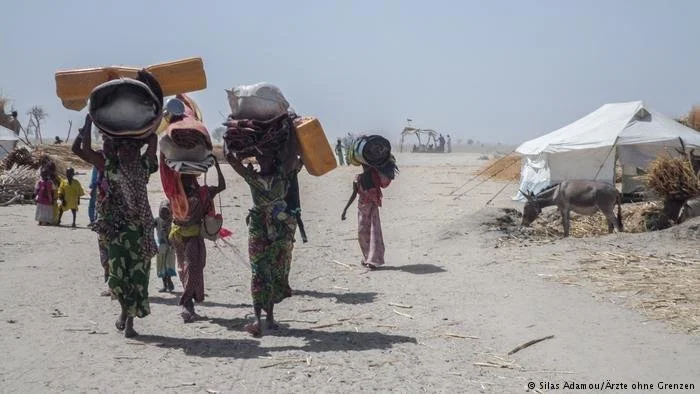How the Designation of Nigeria as a Country of Particular Concern May Affect Asylum Seekers and Refugees
Picture Credit: Nigerian refugees Silas Adamou/Doctors without Borders
On 31st October 2025, President Trump designated Nigeria as a Country of Particular Concern (CPC), bringing the plight of Nigerian Christians into international spotlight.
Whilst debates are increasingly emerging online about the merits or otherwise of the CPC label, this article focuses on how the label may affect asylum seekers and refugees from Nigeria. This focus is warranted because much of the ongoing conversations seem to revolve around state-centered interests, with scarce attention to how the imbroglio is viewed from the lens of vulnerable groups.
What does a CPC designation entail?
Simply put, a CPC designation means that the government of the affected country has engaged in or tolerated particularly severe violations of the fundamental right to religious freedom. The violations include torture, prolonged detention without charges, forced disappearance, or other flagrant denial of life, liberty, or security of persons.
The implications of CPC designation are outlined in the International Religious Freedom Act, 1998 (IRFA). Under section 405 (a) and (b) of the IRFA, when a country is designated as a CPC, some of the actions that the US will take include: (a) public condemnation (of the violations) in multilateral fora; (b) delay or cancellation of scientific and cultural exchanges with the foreign government; (c) withdrawal, limitation or suspension of development and security assistance; (d) lobbying international financial institutions (e.g. World Bank and IMF) against granting loans to the foreign government; suspending the export of goods and technologies to the foreign government; and (e) prohibiting commercial relations with the foreign government or entities implicated in the violations, etc.
Asylum seekers, refugees and state politics
Asylum seekers and refugees are often neglected and framed as unwanted burden and threats. The general policy of most states towards them has been restrictionist. For example, in January 2025, President Trump suspended the U.S. Refugee Admissions Program (USRAP). He subsequently introduced an exemption for White South Africans, whom he claimed were facing racial persecution.
In July 2025, Nigeria revealed that it was under pressure (visa restrictions) from the Trump administration to accept Venezuelan deportees or third country prisoners from the US. All this lends credence to the view that states play politics with refugee protection.
Impact of the CPC label on asylum seekers and refugees
Generally, if the US imposes the threatened sanctions on Nigeria as a result of the CPC designation, it may have unintended consequences for the average Nigerian citizen. For a country already grappling with economic instability and security challenges, the withdrawal of US development and security assistance could further exacerbate the conditions that compel ordinary citizens to seek refuge abroad.
“In light of the recent CPC label on Nigeria, the manner in which the US government handles asylum applications from Nigerian Christians may significantly influence broader discourses concerning its true motives and moral credibility.”
Section 405(d) of the IRFA implicitly envisages this possibility and therefore exempts the export or provision of medicine, medical equipment or supplies, food, and other forms of humanitarian assistance from the scope of sanctions that may be imposed by the US. However, this safeguard may not be sufficient. A more effective approach would be to avoid broad, general sanctions and instead target the specific individuals or entities directly connected to the violations, as originally intended by the IRFA.
On the other hand, the CPC designation may have created a glimmer of hope for Nigerian Christians seeking asylum in the US on the grounds of religious persecution. Under international refugee law, states are obliged to grant asylum to persons fleeing such persecution. Similarly, section 243(h)(1) of the US Immigration and Nationality Act prohibits the deportation or return of a foreign national to a country where their freedom—including religious freedom—would be threatened. In this regard, Nigeria’s designation as a CPC may have lessened the burden of proof for Nigerian Christians seeking asylum in the US on the basis of religious persecution.
This view is reinforced by section 601 of the IRFA, which makes the CPC designation a relevant resource for immigration judges, asylum seekers, and refugees. Consequently, while the label lends credibility to the asylum claims of Nigerian Christians, it simultaneously undermines the asylum applications of government officials or other individuals implicated in violations of religious freedom, as provided in section 604 of the IRFA.
Furthermore, the CPC designation presents a crucial test for the US government in upholding its commitment under section 2 of the IRFA to offer refuge to individuals fleeing religious persecution. According to that section, the US’ commitment to providing protection to such persons reflects its dedication to defending the values of freedom and honouring the legacy of its founding leaders, who themselves fled religious persecution abroad.
Conclusion
Although the US government continues to assert its authority as a leading global advocate and bastion of religious freedom, its interventions in Africa are often perceived as being politically motivated. In light of the recent CPC label on Nigeria, the manner in which the US government handles asylum applications from Nigerian Christians may significantly influence broader discourses concerning its true motives and moral credibility.


